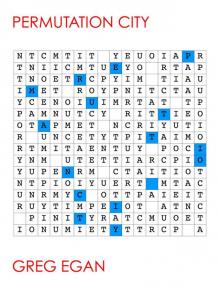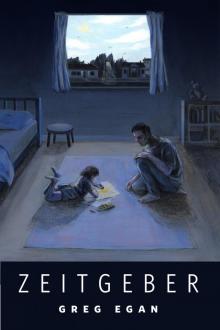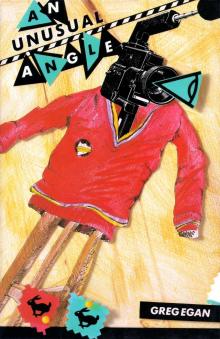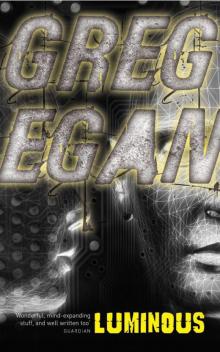The Nearest Read online
Page 2
“Was he happy to see you anyway?” Kate asked. She knew that Hassan and Amir had been close; better a visit from his brother than from a total stranger.
“He was happy to have Amir to talk to, but not so happy about where they must have been.”
“Back in Isfahan?”
Reza shook his head. “He thinks he’s in immigration detention. Why else would he be locked up by people speaking English?”
“Jesus. I hope the staff there are nothing like those pricks.” Kate’s most enduring memory of all the stories she’d heard from Hassan had been the time some fresh-faced girl from Port Augusta—probably nineteen or twenty, knowing nothing of life, puffed up with self-importance by her uniform—had told this man who’d seen his parents executed by the mullahs, and who’d spent four years imprisoned in various corners of the Australian desert, that because he was on hunger strike he would be treated like a child, and denied such extravagant privileges as phone calls and visitors, until he learned to grow up.
“They do their best,” Reza said. “And I don’t think he thinks that all the time.”
Kate took his hand and squeezed it.
“I just need to show a makeup artist photos of my grandfather,” Reza mused. “With a few wigs and costumes and the right soundtrack, I bet I could take him back to the days before Khomeini.”
Kate laughed softly. Then she said, “What if you brought him here?”
Reza was silent for a while; he must have thought about it many times, but he’d never broached it with her. “It wouldn’t work,” he said finally. “Watching him and Michael at the same time would be impossible.”
“Okay.” Kate felt a twinge of guilt; she’d only dared ask because she was almost certain of the answer. “But maybe you can talk to the doctor about the best way to make him feel…” She groped for the right word; how could he feel free, when he really couldn’t walk out the door? “Normal.”
“Yeah. I’ll phone her in the morning.”
Kate switched off the bedside lamp and lay in the dark. The money they were paying for the nursing home would be enough to pay for some part-time home care; Reza wouldn’t have had to handle everything alone. But she could not have her father-in-law living in the same house as Michael. Nothing she’d seen or heard had ever made her think that he would harbor the slightest ill will for any child, whether or not he was capable of understanding that the boy was his grandson. But once someone lost their grip on reality, it wasn’t safe to make any assumptions at all about what they might do.
3
Kate was dragged out of sleep by her phone buzzing, with a tone indicating the kind of alert that wouldn’t leave her in peace until she responded with a suitably lucid acknowledgment. She picked the thing up off the table by the bed and peered at the screen.
“Copy that,” she intoned hoarsely. “I’ll be there in twenty minutes.”
“What is it?” Reza asked. He sounded more awake than she was.
“They found the car.”
When Kate arrived at the riverbank, the tow truck was still getting into position. Natalie’s station wagon had veered off this quiet road at a point where there were no real barriers between asphalt and water. It had left a trail of minor damage in the grass and reeds; to any passing motorist who’d given it a second thought, it probably looked no more suspicious than someone having tried to use the grass to make a U-turn. But tonight, an ER nurse on her way home from her shift had seen moonlight glinting off the metal bobbing in the reeds, and slowed down to take a closer look.
The water where the car had ended up wasn’t deep; the two traffic cops who’d come to investigate had reached it in waders. Kate was still waiting for Roma Street to authorize divers, but she doubted they’d find anything. If Natalie had been able to get out of the submerged car at all, she would not have required any superhuman abilities to make it back to the riverbank. This looked more like an attempt to hide the vehicle than an attempt at suicide. If she’d been overcome by remorse, she would have driven off a bridge.
Kate stood and waited while the traffic cops and the tow truck operator hooked up the winch and dragged the station wagon out of the water and up onto the back of the truck. Then the truck got bogged in the mud, so they had to put boards under the wheels to free it. By the time the truck was able to maneuver itself back onto solid ground, Kate had lost patience. She put on a pair of gloves and climbed up beside the station wagon, flashlight in hand.
All the doors were closed, and all the windows open; Natalie might well have been able to squeeze through a window, conscious and unharmed, but it seemed unlikely that her body had just floated out. The interior was full of silty water and vegetation, and anything not fixed that had been on the seats or the dashboard would either be buried in that muck or left behind in the river. Kate reached in and opened the glove box, which discharged a stream of water carrying a pair of plastic sunglasses and a chapstick. She groped below the dashboard for the manual release for the hood, fought with it against the sludge and grit that was blocking the mechanism, then finally heard a satisfying click.
When she walked around to the front of the car and peered in, she saw the black box, still intact. The data recorders were meant to be robust enough to survive battery fires, so a few days of immersion would be nothing. She turned and called out to the traffic cops, “Have you got an interface cable?”
“We should wait until we get to the compound, Sarge,” the older of the two replied.
“Do you have the cable or not?”
He stared back at her for a moment, then walked over to his car. Kate jumped down and went to fetch her notepad.
The data only took a few seconds to transfer, but it was encrypted; Kate sat in her car and fought her way through the process of persuading the manufacturer to send her the key. A magistrate had authorized the decryption on the day the car went missing, and she had a digital certificate attesting to that fact, but it still took three attempts to convince the Toyota website that she wasn’t a bot or a hacker.
She started with the plunge into the river. Natalie had shut off the driver supervision features ten minutes before, and while the car’s software fell somewhat short of psychiatric qualifications, up to that point it had not assessed her as being affected by any drug or medical condition: She had not been swerving erratically, or shouting obscenities, or nodding off behind the wheel. The manual override had amounted to telling the car not to trust any of its own systems from then on, so while the black box had dutifully logged her GPS coordinates as she steered off the road, the car itself had become agnostic about the wisdom of this behavior. For all it knew, the driver might have had an honest reason to believe that the car’s sensors were broken and it was liable to kill someone if it didn’t butt out and let a human take over completely.
But the GPS trace was enough to show that Natalie hadn’t been driving terribly fast at any point. She’d sped up enough to ensure that her momentum would take her over the riverbank and into the water, but she hadn’t slammed her foot down and accelerated wildly, rushing toward oblivion. When the car came to a stop in the water, it hadn’t even triggered the airbags.
Kate went back to the morning of the killings and followed the car away from the scene. At first, Natalie seemed to be heading straight for her mother’s house, but when she came within a few blocks of it, she changed her mind. She’d turned around and started driving toward her friend Mina’s apartment, only to back out again. Then her brother’s house. Then two other friends. She’d had no phone with her, and all of these people had claimed that they’d heard nothing from Natalie on that day, or since. But apparently, every time she’d made a plan to seek help, she’d given up on the idea without waiting to be rebuffed.
Kate could understand a woman who’d killed her family in a psychotic fugue snapping out of it and turning in desperation to her mother, only to decide at the last minute that she had no hope of being treated with anything but revulsion. But why would she then imagine that a
whole succession of other people might be more forgiving, only to abandon that hope each time it was about to be tested?
After all the aborted journeys toward familiar faces, Natalie had driven to a shopping mall, far from her own home, and the car had remained parked there for almost three hours. That seemed like a long time to spend gathering provisions for a dash out of town—which she’d turned out to have no intention of doing, unless she’d somehow procured access to another vehicle. She’d taken her bank cards when she fled from the house, but hadn’t used them anywhere; whatever she’d bought in the mall, she must have paid for it with the remnants of her last cash withdrawal of three hundred dollars, from a few days before.
When she left the mall, she’d driven around the city in a wide arc until evening, as if she were simply killing time. She’d stopped at a fast food strip around nine o’clock, and then headed for the river to ditch the car.
Kate heard birdsong and looked away from her notepad; it was almost dawn. She checked the status of her request for divers; it had been flagged as “on hold” until a forensics team had examined the car itself.
She sent Reza a message to tell him she wouldn’t be home, then drove off in search of a diner where she could grab breakfast and use the restroom. In the mirror, she looked puffy-eyed and disheveled; she took off her shirt and washed under her arms. Natalie must have been in a much worse state when she waded out of the river, but maybe she’d been carrying a change of clothes in a plastic bag. After six days, three with rain, it was too late to send in dogs to try to pick up her scent from the riverbank.
Kate sat in a booth in the diner drinking coffee until it was almost seven o’clock, then she drove to the shopping mall where Natalie had parked for three hours. The security cameras covered the whole parking lot, and it wasn’t hard to find the moment in the recordings when Natalie drove in, but when she left the car, carrying two large, empty shopping bags, she walked away, out onto the street. Kate went through all the footage of the pedestrian entrances, but Natalie hadn’t doubled back. Whatever she’d bought in that time, she’d bought somewhere else. There were hundreds of small, freestanding shops within an hour’s walk of the mall.
Kate returned to the parking lot footage, at the time she knew the car had departed. Natalie appeared, with the shopping bags bulging, but it was impossible to see what they contained. New clothes? Hair dye? Scissors? It wouldn’t take much for her to render herself unrecognizable to anyone but her closest friends. A clear enough shot by a public CCTV camera might still trigger a face-matching algorithm, but she’d have to be much stupider than she’d proved to be so far to offer herself up to that kind of scrutiny.
The mall security guard had been watching over Kate’s shoulder. “That’s the woman who killed her own kids?” he asked. Natalie’s face was all over the media as a missing person, but the official line was still far from naming her as a suspect.
“Maybe.” Kate turned to him with a warning glance; she really didn’t want to hear anyone’s opinion on what fate Natalie deserved.
“Good luck,” he said.
She left the mall and walked out onto the street. “Mark every retailer in a six-kilometer radius,” she told her notepad, “and give me a path that visits them all.”
4
Kate woke with a headache and squinted at the bedside clock. It was ten minutes to three. She groaned softly and closed her eyes, then felt someone’s warm, naked skin brush against her.
She jerked her arm away and leaped out of bed. There was enough light coming through the curtains for her to see the man lying asleep where Reza should have been.
She was trembling from the shock, but she tried to calm herself and plan her next move carefully. She thought of going to the kitchen and arming herself with a knife, but if there was a struggle that might not work in her favor.
She snatched up her phone and tiptoed into the passageway. The safest thing might be to take Michael out to the car and drive away, before she even risked calling for help. But where was Reza? Any protracted scuffle in the bedroom would have woken her, so he must have been lured out of the room somehow—before being tied up and gagged, maybe drugged, maybe beaten senseless. So she had to get Michael to safety, but then return as quickly as possible, and do it all without waking the intruder.
She walked down the passageway in the darkness, treading as lightly as she could. As she entered the nursery, she felt her skin prickling with horror, and she had to cover her mouth with her hand to keep herself silent. She stared at the shape in the cot, afraid to raise the phone and illuminate it, but when she finally found the courage, the harsh light made the revelation unbearable. She staggered back, then fled.
She ran into the bedroom and switched on the light. “What have you done to him?” she roared. “What have you done to my son?”
The intruder shielded his face with his arm and then lowered it and peered at her groggily. “Kate? What’s happened?” He climbed off the bed and approached her; she flinched away from him, raising one hand with her fist clenched. She didn’t need a weapon; she’d beat the truth out of him with her bare hands.
“Kate? Talk to me!” He stood, rooted to the spot, feigning concern. “Has something happened to Michael? Should I call an ambulance?”
“Don’t play games with me!” she bellowed. “Where have you taken him?”
“Are you saying he’s not in his cot?” The intruder rushed past her, out into the passageway; she followed him halfway, but couldn’t bring herself to go back into the nursery. He switched on the light, then after a while she heard him whispering, “Shh, pesaram, it’s all right.” So this man spoke Persian—or was he just mocking her? Had he bugged the house and listened to all the things she and Reza said?
He came out from the nursery and walked up to her. “He looks fine to me. What got you so worried?”
Kate said, “You have ten seconds to tell me where my son is.”
“Now you’re frightening me.” The intruder reached down and scratched his hip beneath the waistband of his shorts, as unselfconsciously as if he spent every night wandering half-naked through a different stranger’s house. “Are you sick?” He reached up to put his hand on Kate’s forehead; she grabbed his arm and twisted it, bringing him to his knees.
“What’s wrong with you?” he gasped, wincing from the pain but keeping himself from shouting, as if his greatest fear was “waking” the mechanical doll he’d planted in the cot. Kate got him in a choke hold; he went limp in her arms, not even trying to fight her.
“I swear I’ll kill you,” she said. “If you don’t take me to my son, I’ll slit your fucking throat and hang you from a meat hook.”
The man started weeping, his whole body shuddering as he sobbed. Kate stared down at his blubbering face, desperately clinging to the hope that whatever he’d done to Reza and Michael that had left him so ashamed, they were still alive somewhere. “Take me to them now, and I’ll say you cooperated. The quicker you do this, the better things will go for you.”
“All right,” he replied. He sounded utterly defeated. For someone who’d been so brazen just minutes before, he hadn’t taken long to fold.
Kate released him and stepped away. “So where are they?”
He clambered to his feet. “I need to call someone. They’ll bring them here.”
“No, no, no!” Kate spread her arms so he couldn’t get past her down the hall. She wasn’t having him summoning accomplices. “You take me to them, alone. Are they in the house?”
He hesitated. “No. We’ll need to take a drive.”
Kate stood in silence, trying to think. She should call for backup, get the fucker cuffed and under control. But if he stopped cooperating, what redress would she have? As soon as she got anyone else involved, there’d be no point threatening to gut him like a pig; he could sit in his prison cell, laughing, while Reza and Michael starved to death, or worse.
“All right,” she said. “So you’d better put some clothes on.”
She walked into the bedroom ahead of him and scooped up Reza’s phone. She’d half expected him to try to flee, but he followed close behind her and proceeded to dress in Reza’s clothes. Kate stood watching him, dazed; not only did the clothes fit him—well enough—his resemblance to her husband was striking, right down to the pattern of freckles on his shoulders and the way his uncombed hair stuck up at the side. But did the kidnappers really think that she’d be fooled by such superficial details?
“Turn around and face the wall,” she said. He complied, and she dressed quickly.
“Okay, I’m done. Come on.”
“Can we take…?” He gestured toward the nursery.
Kate scowled at him, disbelieving; she thought he was about to start crying again. “Why would we take that thing with us? I’ll put it out with the garbage.”
The intruder stared at her. “When you get back, with Michael?”
“Yes! It’s not a priority. Now, come on!”
He followed her out of the house; she unlocked the car and got into the driver’s seat. He joined her, and she reversed quickly onto the street.
“Which way?” she asked.
“South.”
She drove down to the corner and turned toward Gympie Road. There was no other traffic in sight, no lights showing in any of the houses. She glanced at the man, sitting meekly beside her in his borrowed clothes. “So, what was the plan?”
“What do you mean?”
“Were you going to ask for money? Or was this about fixing some case? You wanted me to tamper with evidence, or make a file disappear?”
He didn’t reply.
Kate laughed humorlessly. “And the idea that you could just lie down in my bed and that would buy some time to get them further away … for fuck’s sake, how stupid can you be? You might look a bit like my husband, but do you think I couldn’t tell the difference?”
The man said, “What gave me away?”

 Zendegi
Zendegi Permutation City
Permutation City The Eternal Flame
The Eternal Flame Artifacts
Artifacts Wang's Carpets
Wang's Carpets Dichronauts
Dichronauts Incandescence
Incandescence Teranesia
Teranesia Schild's Ladder
Schild's Ladder Quarantine
Quarantine The Four Thousand, the Eight Hundred
The Four Thousand, the Eight Hundred The Clockwork Rocket
The Clockwork Rocket Zeitgeber
Zeitgeber Phoresis
Phoresis The Nearest
The Nearest Diaspora
Diaspora Instantiation
Instantiation Distress
Distress An Unusual Angle
An Unusual Angle Oceanic
Oceanic The Arrows of Time
The Arrows of Time Axiomatic
Axiomatic![Anthology 2. Luminous [1998, 2010] Read online](http://i1.bookreadfree.com/i/03/18/anthology_2_luminous_1998_2010_preview.jpg) Anthology 2. Luminous [1998, 2010]
Anthology 2. Luminous [1998, 2010] Perihelion Summer
Perihelion Summer Luminous
Luminous